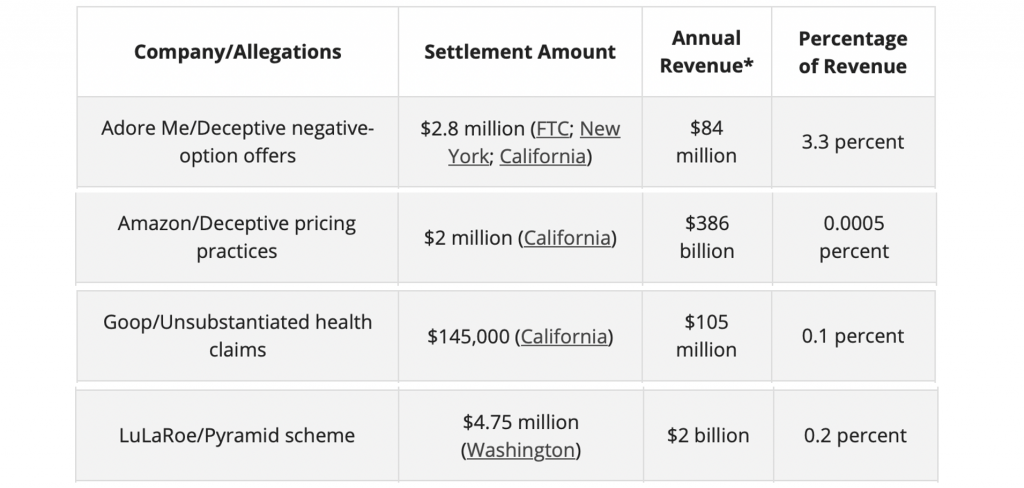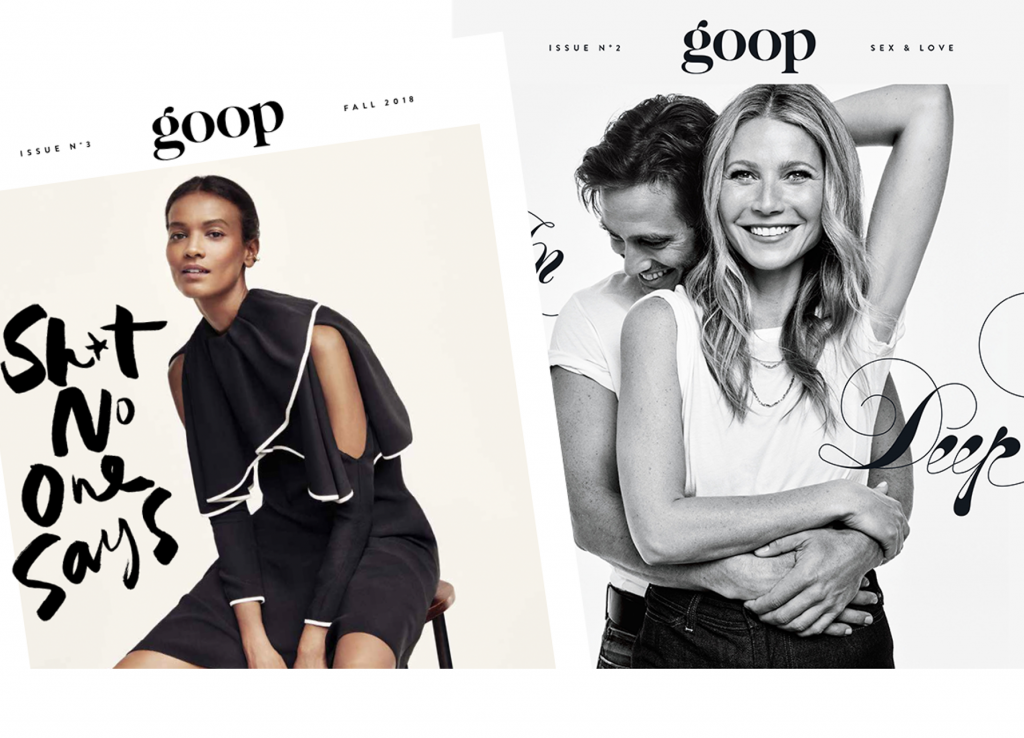In 2018, Gwyneth Paltrow’s Goop made headlines when it agreed to pay $145,000 to settle the false advertising lawsuit waged against it by the state of California in connection with the marketing of its $66 vaginal Jade and Rose Quartz Egg and its Inner Judge Flower Essence Blend. The case and corresponding settlement followed from deceptive advertising cases initiated against lingerie company Adore Me in New York and California for allegedly misleading consumers who enrolled in what the Federal Trade Commission (“FTC”) called “a negative-option membership program offering discounts and other benefits, and made it hard for them to cancel their memberships.” And more recently, LuLaRoe agreed to pay $4.75 million to settle the lawsuit filed against it for allegedly violating the Anti-Pyramid Promotional Scheme Act.
These cases – and others like them – and the settlements that followed have garnered quite a bit of attention, including from the media, and the monetary penalties at play can “act as a deterrent against engaging in deceptive marketing,” according to Truth in Advertising (“TINA”), which recently noted that such settlements are one way that regulators like the FTC “seek to discourage unlawful behavior.” However, the Connecticut-based advertising watchdog cautions that “for many companies that have paid ostensibly substantial amounts of money to settle allegations of false or deceptive advertising, it is a small price to pay compared to the amount of money coming in.”
TINA cites the settlements by Goop, Adore Me, LuLaRoe, and Amazon as examples, stating that Adore Me, for instance, generates $84 million in annual revenue, meaning that the $2.8 million that it paid out to settle the cases waged against it represents some 3.3 percent of its annual sales. The $2 million that Amazon paid in April of this year to settle the suit that accused it of misleading consumers by way of deceptive reference pricing amounted to 0.0005 percent of the $386 billion in revenue that it generated last year.
In other words, TINA argues that “at a time when the FTC’s ability to get consumer refunds hangs in the balance, any amount of money obtained in a false or deceptive advertising settlement may seem like a win for both the FTC and consumers.” However, for many of the companies at issue, these settlements are “just the cost of doing business” and may not actually result in necessary change. Goop appears to be an example of this. On the heels of settling the suit filed against it in 2018, which included a formal order that the company refrain from “making and/or disseminating any statement regarding any nutritional supplement or medical deceive that is false and misleading or has the tendency or capacity to deceive or mislead,” the burgeoning company came under fire again two years later for allegedly making false and misleading health claims about its products.

Fast forward to early 2020 and TINA argued that Goop was running afoul of the law again – and in the process, violating the court order that came with its settlement. “Goop seems to have forgotten that it is legally bound by a court order to refrain from engaging in deceptive marketing or, worse, is knowingly violating the order,” Bonnie Patten, TINA’s Executive Director, said in a statement after the watchdog filed a new complaint with district attorneys in California. According to TINA, Goop was “deceptively market[ing] products” – from candles to herbal supplements – as capable of “treating and/or mitigating the symptoms of several medical conditions, including anxiety, depression, OCD, hormone imbalances, and hair loss, as well as address the symptoms of excessive alcohol consumption.”
For years, Paltrow and reps for Goop have pushed back against widespread media claims that the company operates in the realm of “pseudoscience,” and addressing the 2018 settlement, Paltrow told the Washington Post that fall that the company – which started as a wellness newsletter in 2008 and went on to garner a reported valuation of a $250 million, following a Series C round of funding that brought in $50 million from the likes of NEA, Lightspeed and Felix Capital a decade later – “didn’t have to admit any wrongdoing, but we just wanted to settle it and put it behind us.” She also asserted that the case was a learning experience, and noted that in the time since, Goop added a science and research team to its roster of employees, as well as a regulatory team to vet products.
Not out of the clear when it comes to legal issues, the company has been named in a proposed class action complaint in California for allegedly offering up a candle that has, on at least one occasion, exploded during normal use as a result of a “design defect and/or manufacturing flaw.” According to the complaint that was filed with the U.S. District Court for the Central District of California on May 17, 2021, plaintiff Colby Watson claims that Goop’s widely-discussed “This Smells Like My Vagina” candle is “inherently dangerous” and that the company is on the hook for failing to “warn customers of the defect or instruct purchasers on how to handle situations in which the candles become engulfed in flames and/or explode.”
In response to the suit, which is currently underway, a rep for Goop stated, “We’re confident this claim is frivolous and an attempt to secure an outsized payout from a press-heavy product. We stand behind the brands we carry and the safety of the products we sell.”











